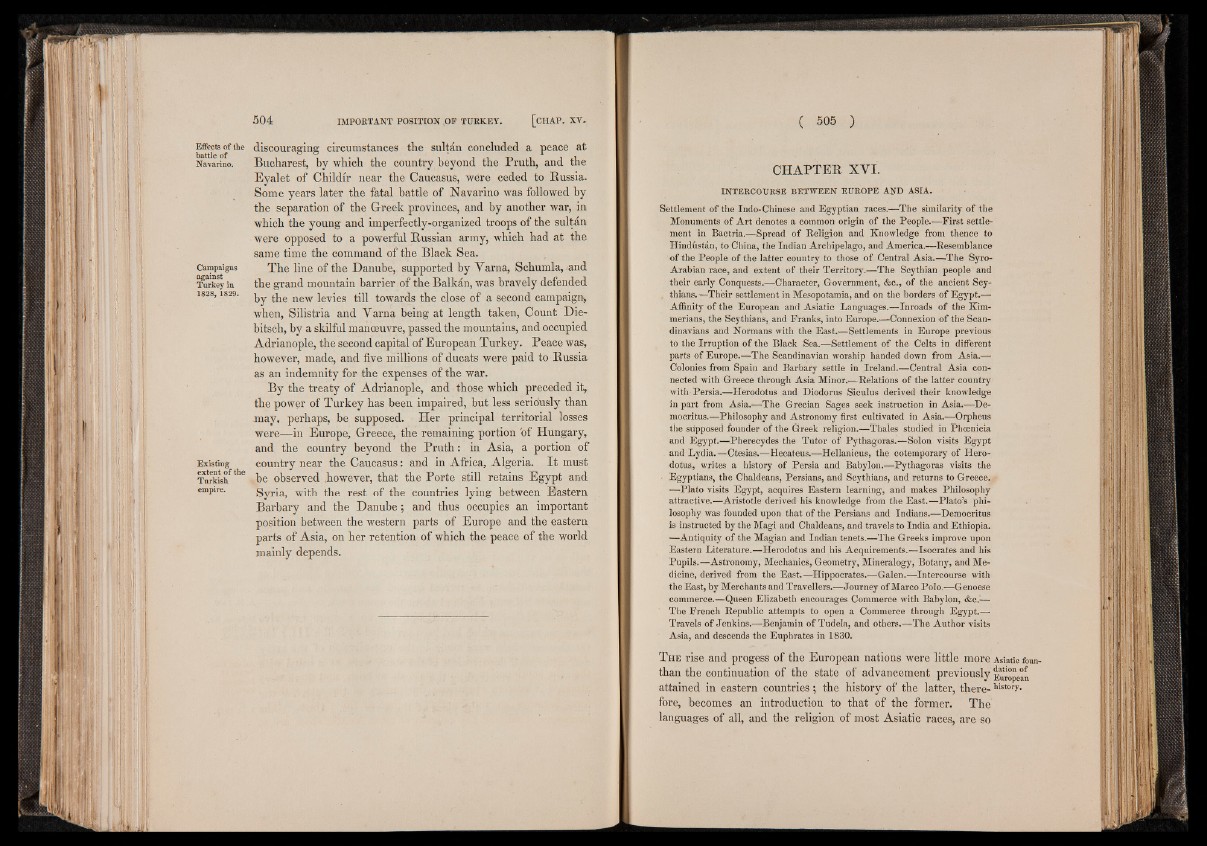
Effects of the
battle of
Navarino.
Campaigns
against
Turkey in
1828, 1829.
Existing
extent of the
Turkish
empire.
discouraging circumstances the sultán concluded a peace at
Bucharest, by which the country beyond the Pruth, and the
Eyalet of Childir near the Caucasus, were ceded to Russia.
Some years later the fatal battle of Navarino was followed by
the separation of the Greek provinces, and by another war, in
which the young and imperfectly-organized troops of the sultán
were opposed to a powerful Russian army, which had at the
same time the command of the Black Sea.
The line of the Danube, supported by Varna, Schumla, and
the grand mountain barrier of the Balkán, was bravely defended
by the new levies till towards the close of a second campaign,
when, Silistria and Yarna being at length taken, Count Die-
bitsch, by a skilful manoeuvre, passed the mountains, and occupied
Adrianople, the second capital of European Turkey. Peace was,
however, made, and five millions of ducats were paid to Russia
as an indemnity for the expenses of the war.
By the treaty of Adrianople, and those which preceded it,
the power of Turkey has been impaired, but less seriously than
may, perhaps, be supposed. Her principal territorial losses
were—in Europe, Greece, the remaining portion 'of Hungary,
and the country beyond the Pruth: in Asia, a portion of
country near the Caucasus: and in Africa, Algeria. It must
be observed .however, that the Porte still retains Egypt and
Syria, with the rest of the countries lying between Eastern
Barbary and the Danube; and thus occupies an important
position between the western parts of Europe and the eastern
parts of Asia, on her retention of which the peace of the world
mainly depends.
CHAPTER XYI.
INTERCOURSE BETWEEN EUROPE AND ASIA.
Settlement of the Indo-Chinese and Egyptian races.—The similarity of the
Monuments of A rt denotes a common origin of the People.—First settlement
in Bactria.—Spread o f Religion and Knowledge from thence to
Hindustan, to China, the Indian Archipelago, and America.-—Resemblance
o f the People of the latter country to those o f Central Asia.—The Syro-
Arabian race, and extent of their Territory.—The Scythian people and
their early Conquests.—Character, Government, &c., of the ancient Scy-
. thians.—Their settlement in Mesopotamia, and on the borders of Egypt.—
Affinity of the European and Asiatic Languages.—Inroads o f the Kim-
merians, the Scythians, and Franks, into Europe.—Connexion of the Scandinavians
and Normans with the East.—Settlements in Europe previous
to the Irruption of the Black Sea.—Settlement o f the Celts in different
parts of Europe.—The Scandinavian worship handed down from Asia.—
Colonies from Spain and Barbary settle in Ireland.—Central Asia connected
with Greece through Asia Minor.—Relations of the latter country
with Persia.—Herodotus and Diodorus Siculus derived their knowledge
in part from Asia.—The Grecian Sages seek instruction in Asia.—Democritus.—
Philosophy and Astronomy first cultivated in Asia.—Orpheus
the supposed founder of the Greek religion.—Thales studied in Phoenicia
and Egypt.—Pherecydes the Tutor o f Pythagoras.—Solon visits Egypt
and Lydia.—Ctesias.—Hecateus.—Hellanicus, the cotemporary of Herodotus,
writes a history of Persia and Babylon.—Pythagoras visits the
• Egyptians, the Chaldeans, Persians, and Scythians, and returns to Greece.-*
-—Plato visits Egypt, acquires Eastern learning, and makes Philosophy
attractive.—Aristotle derived his knowledge from the East.—Plato’s philosophy
was founded upon that of the Persians and Indians.—Democritus
is instructed by the Magi and Chaldeans, and travels to India and Ethiopia.
—Antiquity of the Magian and Indian tenets.—The Greeks improve upon
Eastern Literature.—Herodotus and his Acquirements.—Isocrates and his
Pupils.—Astronomy, Mechanics, Geometry, Mineralogy, Botany, and Medicine,
derived from the East.—Hippocrates.-—Galen.—Intercourse with
the East, by Merchants and Travellers.—Journey of Marco Polo.—Genoese
commerce.—Queen Elizabeth encourages Commerce with Babylon, &c.—
The French Republic attempts to open a Commerce through Egypt.—
Travels of Jenkins.—Benjamin of Tudela, and others.—The Author visits
Asia, and descends the Euphrates in 1830.
T h e rise and progess of the European nations were little more Asiatic foun-
than the continuation of the state of advancement previously European
attained in eastern countries; the history of the latter, there- hist0T-
fore, becomes an introduction tq that of the former. The
languages of all, and the religion of most Asiatic races, are so